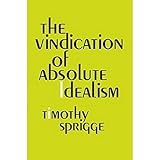The Vindication of Absolute Idealism / Timothy Sprigge.
Material type: TextPublisher: Edinburgh : Edinburgh University Press, [2022]Copyright date: ©1984Description: 1 online resource (291 p.)Content type:
TextPublisher: Edinburgh : Edinburgh University Press, [2022]Copyright date: ©1984Description: 1 online resource (291 p.)Content type: - 9780852244555
- 9781474472814
- online - DeGruyter
- Issued also in print.
| Item type | Current library | Call number | URL | Status | Notes | Barcode | |
|---|---|---|---|---|---|---|---|
 eBook
eBook
|
Biblioteca "Angelicum" Pont. Univ. S.Tommaso d'Aquino Nuvola online | online - DeGruyter (Browse shelf(Opens below)) | Online access | Not for loan (Accesso limitato) | Accesso per gli utenti autorizzati / Access for authorized users | (dgr)9781474472814 |
Frontmatter -- Content -- Preface -- Preamble -- I. Of Consciousness and Other Things -- 1. What consciousness is -- 2. The Continuity of Consciousness -- 3. Judgement -- 4. Desire and Will -- 5. Past and Future -- 6. The Method and the Goal of Metaphysics -- 2. Various Conceptions of Physical Reality and their Common Upshot -- Introduction -- I. Naive Realism -- 2. Subjective Idealism -- 3. Naive Scientism -- 4. Critical Scientism -- 5. Phenomenalism -- 6. Phenomenalist Instrumentalism -- 7. The Physical Thing as Concrete Universal -- 8. The Adverbial Theory of Perception -- 3 The Vindication of Panpsychism -- First argument for panpsychism: It is superior to any other answer ever offered to a certain question which is evidently meaningful -- Second argument for panpsychism : It makes the mind-body relationship more intelligible -- Third argument for panpsychism: It rightly takes as our clue to the nature of noumenal reality in general the one initial example we have of it -- Fourth argument for panpsychism: There is no conceivable sort of concrete actuality but sentience -- Some objections to the fourth argument considered -- 4. The Sentience of the Whole and the Sentience of the Parts -- Introduction -- 5. Relations -- 1. Properties and Individual Essences -- 2. Ideal Relations -- 3. Holistic Relations -- 4· 'Prehending' and 'Objectification' -- 5. The Question of External Relations -- 6. Concluding Remark on the Status of Relations -- 6. The Absolute -- 1. Main Conclusion -- 2. The Compounding of Consciousness -- 3. Judgement again, Memory and Causal Influence -- 4. Types of Monism -- Notes -- Index
restricted access online access with authorization star
http://purl.org/coar/access_right/c_16ec
When Timothy Sprigge's The Vindication of Absolute Idealism appeared in 1983 it ran very much against the grain of the dominant linguistic and analytic traditions of philosophy in Britain. The very title of this work was a challenge to those who believed that Absolute Idealism fell with the critiques of Bertrand Russell and G. E. Moore at the beginning of the 20th century. Sprigge, however, saw himself as providing an underrepresented position in the philosophical spectrum rather than as advocating an abandoned view. For him, idealism did not fall at any determinate point in the history of philosophy. The truth of any philosophical thesis cannot depend on what happens to be currently fashionable, but rather must stand on the soundness of philosophical argument. To this end, The Vindication of Absolute Idealism is a bold statement of his conclusions, a synthesis of panpsychism and absolute idealism, which he contends is the most satisfactory solution to the question of the nature of consciousness and the mind-body problem. Sprigge's view of consciousness remains a challenge to mainstream physicalism and a viable option that addresses pressing contemporary concerns not only in metaphysics and philosophy of mind but also in environmental ethics and animal rights.
Issued also in print.
Mode of access: Internet via World Wide Web.
In English.
Description based on online resource; title from PDF title page (publisher's Web site, viewed 02. Mrz 2022)


